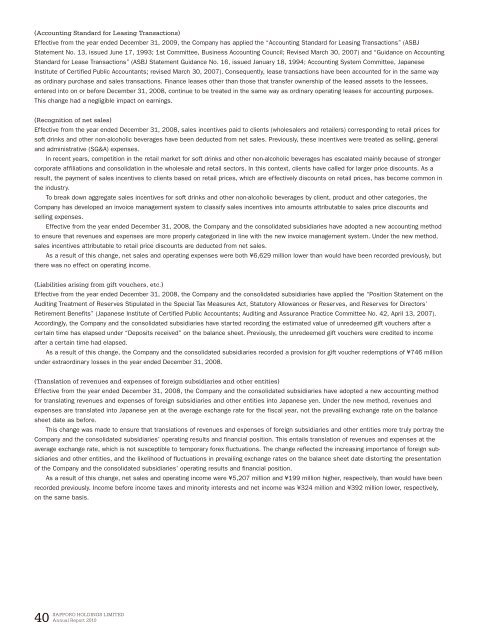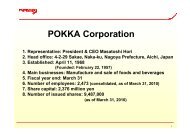Issue of Annual Report 2010
Issue of Annual Report 2010
Issue of Annual Report 2010
You also want an ePaper? Increase the reach of your titles
YUMPU automatically turns print PDFs into web optimized ePapers that Google loves.
(Accounting Standard for Leasing Transactions)<br />
Effective from the year ended December 31, 2009, the Company has applied the “Accounting Standard for Leasing Transactions” (ASBJ<br />
Statement No. 13, issued June 17, 1993; 1st Committee, Business Accounting Council; Revised March 30, 2007) and “Guidance on Accounting<br />
Standard for Lease Transactions” (ASBJ Statement Guidance No. 16, issued January 18, 1994; Accounting System Committee, Japanese<br />
Institute <strong>of</strong> Certified Public Accountants; revised March 30, 2007). Consequently, lease transactions have been accounted for in the same way<br />
as ordinary purchase and sales transactions. Finance leases other than those that transfer ownership <strong>of</strong> the leased assets to the lessees,<br />
entered into on or before December 31, 2008, continue to be treated in the same way as ordinary operating leases for accounting purposes.<br />
This change had a negligible impact on earnings.<br />
(Recognition <strong>of</strong> net sales)<br />
Effective from the year ended December 31, 2008, sales incentives paid to clients (wholesalers and retailers) corresponding to retail prices for<br />
s<strong>of</strong>t drinks and other non-alcoholic beverages have been deducted from net sales. Previously, these incentives were treated as selling, general<br />
and administrative (SG&A) expenses.<br />
In recent years, competition in the retail market for s<strong>of</strong>t drinks and other non-alcoholic beverages has escalated mainly because <strong>of</strong> stronger<br />
corporate affiliations and consolidation in the wholesale and retail sectors. In this context, clients have called for larger price discounts. As a<br />
result, the payment <strong>of</strong> sales incentives to clients based on retail prices, which are effectively discounts on retail prices, has become common in<br />
the industry.<br />
To break down aggregate sales incentives for s<strong>of</strong>t drinks and other non-alcoholic beverages by client, product and other categories, the<br />
Company has developed an invoice management system to classify sales incentives into amounts attributable to sales price discounts and<br />
selling expenses.<br />
Effective from the year ended December 31, 2008, the Company and the consolidated subsidiaries have adopted a new accounting method<br />
to ensure that revenues and expenses are more properly categorized in line with the new invoice management system. Under the new method,<br />
sales incentives attributable to retail price discounts are deducted from net sales.<br />
As a result <strong>of</strong> this change, net sales and operating expenses were both ¥6,629 million lower than would have been recorded previously, but<br />
there was no effect on operating income.<br />
(Liabilities arising from gift vouchers, etc.)<br />
Effective from the year ended December 31, 2008, the Company and the consolidated subsidiaries have applied the “Position Statement on the<br />
Auditing Treatment <strong>of</strong> Reserves Stipulated in the Special Tax Measures Act, Statutory Allowances or Reserves, and Reserves for Directors’<br />
Retirement Benefits” (Japanese Institute <strong>of</strong> Certified Public Accountants; Auditing and Assurance Practice Committee No. 42, April 13, 2007).<br />
Accordingly, the Company and the consolidated subsidiaries have started recording the estimated value <strong>of</strong> unredeemed gift vouchers after a<br />
certain time has elapsed under “Deposits received” on the balance sheet. Previously, the unredeemed gift vouchers were credited to income<br />
after a certain time had elapsed.<br />
As a result <strong>of</strong> this change, the Company and the consolidated subsidiaries recorded a provision for gift voucher redemptions <strong>of</strong> ¥746 million<br />
under extraordinary losses in the year ended December 31, 2008.<br />
(Translation <strong>of</strong> revenues and expenses <strong>of</strong> foreign subsidiaries and other entities)<br />
Effective from the year ended December 31, 2008, the Company and the consolidated subsidiaries have adopted a new accounting method<br />
for translating revenues and expenses <strong>of</strong> foreign subsidiaries and other entities into Japanese yen. Under the new method, revenues and<br />
expenses are translated into Japanese yen at the average exchange rate for the fiscal year, not the prevailing exchange rate on the balance<br />
sheet date as before.<br />
This change was made to ensure that translations <strong>of</strong> revenues and expenses <strong>of</strong> foreign subsidiaries and other entities more truly portray the<br />
Company and the consolidated subsidiaries’ operating results and financial position. This entails translation <strong>of</strong> revenues and expenses at the<br />
average exchange rate, which is not susceptible to temporary forex fluctuations. The change reflected the increasing importance <strong>of</strong> foreign subsidiaries<br />
and other entities, and the likelihood <strong>of</strong> fluctuations in prevailing exchange rates on the balance sheet date distorting the presentation<br />
<strong>of</strong> the Company and the consolidated subsidiaries’ operating results and financial position.<br />
As a result <strong>of</strong> this change, net sales and operating income were ¥5,207 million and ¥199 million higher, respectively, than would have been<br />
recorded previously. Income before income taxes and minority interests and net income was ¥324 million and ¥392 million lower, respectively,<br />
on the same basis.<br />
SAPPORO HOLDINGS LIMITED<br />
40 <strong>Annual</strong> <strong>Report</strong> <strong>2010</strong>



